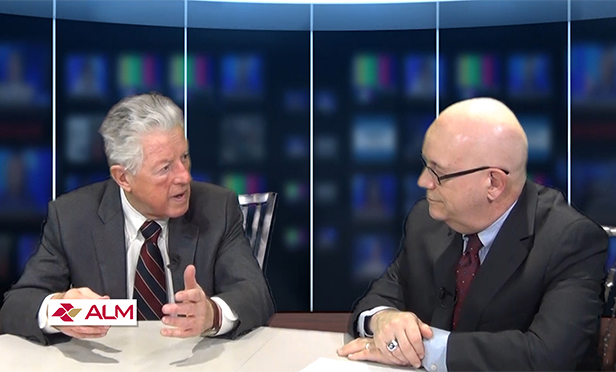
CHERRY HILL, NJ—Continued focus on redevelopment of commercial properties that take advantage of existing infrastructure, rather than creation of new buildings on green sites is likely to be the best approach for New Jersey's future, according to former Gov. James J. Florio.
In an exclusive video interview with GlobeSt.com, Florio says the state needs to use its resources more judiciously, investing to enhance existing sites, rather than building from scratch.
You can watch the exclusive TV interview with former NJ Gov. James J. Florio in the video player below.
“The whole idea is utilizing the infrastructure that is there, particularly in urban areas, as opposed to going out to green fields and creating sewer systems, water systems, highways, and so on,” he says, “focusing our resources where they get the most bang for the buck.”
The city of Camden provides an example, Florio says.
“It's a place that's been troubled for a long period of time and now is starting to come back,” he says. “Market forces appreciated the efficiency of utilizing existing infrastructure, making minimal investments in redeveloping those areas. That is starting to take place and I think it will be a key to success.”
Florio, who as a congressman in the 1970s wrote the primary Superfund legislation known as the Comprehensive Environmental Response Compensation and Liability Act, or CERCLA, stressed the importance of environmental responsibility as a driver of commercial development.
“We were an industrial state for a long time, and in the old days, people didn't pay attention to environmental problems,” Florio says. “We created a lot of Superfund sites, hazardous waste dump sites. We have to appreciate the fact that not having access to clean water, having a proliferation of hazardous waste sites does not help economic development. This shouldn't be a debate between economic development and environmental sensitivity. You're not going to have one without the other.”
Florio is complimentary of newly inaugurated Gov. Phil Murphy's programs, which include increasing state investments in transit, education and environmental projects.
“He talked about the fact that if we want to have a New Jersey transit system that works well, if we want affordable higher education, if we want to have preschool for all our students, we're going to have to have revenues, which means raising taxes,” he says. “He campaigned on that, which is interesting, and was successful. I think he has the opportunity to do some courageous things, because in some respects, spending is not the problem in New Jersey, revenues are. To have revenues, you have to raise taxes, and that's never a popular thing to do.”
Florio thinks voters will accept an honest conversation about taxes, and the so-called “millionaires tax” is part of a common-sense approach.
“Nothing is for nothing,” he says. “We can either pay for fixing our roads or we can have holes in our roads. We can pay for fixing our infrastructure, bridges, tunnels, or we can wait until the bridges and tunnels fall apart. Life is about choices. We know that in our home life, why should it be any different when we talk about government?”
The current political climate poses difficulties to reaching compromises, Florio says. The staging of every political argument in a “winner-take-all” context leaves little room for the compromise and negotiation of past political debates, he says.
“It's much more polarized,” he says. “There was much more opportunity for a degree of collaboration with the opposition. There was tension, but it was never really as venomous as it is now. That's troubling, because you can't resolve problems without forming a consensus.”
Want to continue reading?
Become a Free ALM Digital Reader.
Once you are an ALM Digital Member, you’ll receive:
- Breaking commercial real estate news and analysis, on-site and via our newsletters and custom alerts
- Educational webcasts, white papers, and ebooks from industry thought leaders
- Critical coverage of the property casualty insurance and financial advisory markets on our other ALM sites, PropertyCasualty360 and ThinkAdvisor
Already have an account? Sign In Now
*May exclude premium content© 2025 ALM Global, LLC, All Rights Reserved. Request academic re-use from www.copyright.com. All other uses, submit a request to [email protected]. For more information visit Asset & Logo Licensing.








